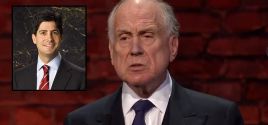Rockefeller Refers to Obama's Science Czar as "Walking on Water"By Terence P. Jeffrey, Editor-in-Chief, CNSNews.comAug. 21, 2009 |
Popular 
Trump Expected to Pick Kevin Warsh, Son-in-Law of Zionist Billionaire Ron Lauder, as Fed Chair

Video Appears to Show Alex Pretti Spit at ICE, Kick Taillight Out of ICE Vehicle in Prior Confrontation

New TikTok CEO Told World Jewish Congress How They Censored Criticism of 'Zionists'

Israeli-American Council Asks Miriam Adelson and Haim Saban How They Control U.S. Politicians

Mark Levin Urges Trump to Strike Iran and Kill the Ayatollah and His Family
 Related: John Holdren, Obama's Science Czar: Forced abortions and mass sterilization needed to save the planetIn a recent congressional hearing, Senate Commerce Chairman John D. Rockefeller IV (D.-W.V.) told John P. Holdren, President Barack Obama’s science czar, that he sometimes refers to Holdren as “walking on water.” Holdren is director the White House Office of Science and Technology Policy and a top adviser to the president on climate-change policy. In writings published in past years, Holdren has advocated “de-development” of the United States and redistribution of wealth both within and between nations. In a 1973 book, Holdren said: “The fetus, given the opportunity to develop properly before birth, and given the essential early socializing experiences and sufficient nourishing food during the crucial early years after birth, will ultimately develop into a human being.” At a July 30 hearing of the Senate Commerce Committee focusing on climate change, Sen. Rockefeller complimented Holdren, using terms that alluded to one of the miracles recounted in the Gospels. “The president, I think, has surrounded himself with some of the most brilliant choices,” said Rockefeller at the hearing. “Dr. Holdren, I don’t want to embarrass you, but I sometimes refer to you as walking on water.” The hearing specifically looked at the administration’s plans to coordinate federal efforts in researching climate change and the possible creation of a National Climate Service, which would make “forecasts and projections” about climate change. Commerce Secretary Gary Locke testified along with Holdren. “Well, I think clearly a national climate service is badly needed,” Locke told the committee. “And this agency or service must provide climate modeling in terms of forecasts and projections,” Locke said. “People need to understand what’s coming down the road and it needs to provide regional and national assessments of climate change so that people in different parts of the region can understand—can get as much as possible tailored scientific information as it pertains to them and their livelihoods and their future.” Holdren said the administration favored the idea of a climate service. “The administration recognizes the need to move forward with the climate services concept,” he said. When Sen. Maria Cantwell (D.-Wash.) asked Holdren about the threat of “abrupt climate change,” Holdren said America should be ready for it. “Dr. Holdren, should we be planning for abrupt climate change, and what are the potential consequences of that?” asked Cantwell. “And how do we get the additional research that we need in that area?” “Well, senator,” said Holdren, “the first thing I would say is we’re already finding climate change is becoming more abrupt than we expected, even a few years ago. Many different aspects of climate change are happening more rapidly than the Intergovernmental Panel on Climate Change predicted in its recent reports." “It could become more abrupt,” Holdren said. “Nobody knows for sure. Our understanding of all the details is not adequate to say exactly which potential tipping point might be crossed that would cause some of the climactic changes that we’re experiencing to accelerate drastically, but we should be ready for it.” At the end of the hearing, Sen. Rockefeller paid tribute to Holdren. “The president, I think, has surrounded himself with some of the most brilliant choices,” Rockefeller said. “Dr. Holdren, I don’t want to embarrass you but I sometimes refer to you as walking on water. “That may be the end of your career,” Rockefeller said. “But, you know, we brought that 5 percent carbon guy from New Hampshire and had him sit right where you are and he told us all about it because you told me about it. A really superb technical scientific team. And everything else: The questions we ask and how do Americans understand all of this and react to it is incredibly important. But what we need to know that is already in place and working is the top part of the team--spreading out and coordinating superb thinking, superb arguments and, you know, a superb policy." “So, I, frankly, it’s one of the most exciting things about this administration is just the presence of all of you,” said Rockefeller. “And on that dour note, the hearing is over.” (The “5 percent carbon guy” Rockefeller referred to is Frank Alix, CEO of Powerspan, a Porstmouth, N.H., company developing technology to remove carbon from coal-burning emissions. Alix told the committee in testimony in March that the 36% of overall U.S. carbon emissions that come from coal could be reduced to 5% with deployment of technology that reduces the carbon in emissions from coal-burning facilities by 90%.) Before joining the Obama administration, Holdren was director of the Woods Hole Research Center and a professor at the John F. Kennedy School of Government at Harvard. He formerly taught at the University of California. In 1995, Holdren co-wrote an essay with Paul Ehrlich and Gretchen Daily of the Center for Conservation Biology at Stanford, in which he argued that mankind should face up to the need for a “world of zero net physical growth” and “population limitation.” The essay is listed among “Recent publications” on Holdren’s curriculum vitae posted at the Woods Hole Web site. (Ehrlich is the author of The Population Bomb, a 1968 bestseller that made the case for zero population growth.) The 1995 essay by Holdren, Ehrlich, and Daily was printed as the first chapter of a book published by the World Bank entitled, “Defining and Measuring Sustainability: The Biogeophysical Foundations.” The book is available online at the World Bank Web site. “We know for certain, for example, that: No form of material growth (including population growth) other than asymptotic growth, is sustainable,” wrote Holdren, Ehrlich and Daily. “Many of the practices inadequately supporting today’s population of 5.5 billion people are unsustainable; and [a]t the sustainability limit, there will be a tradeoff between population and energy-matter throughput per person, hence, ultimately, between economic activity per person and well-being per person. “This is enough,” Holdren, Ehrlich and Daily wrote, “to say quite a lot about what needs to be faced up to eventually (a world of zero net physical growth), what should be done now (change unsustainable practices, reduce excessive material consumption, slow down population growth), and what the penalty will be for postponing attention to population limitation (lower well-being per person).” In this 1995 essay, the authors also argued for global wealth redistribution. “Table 1-1” in the essay was labeled: “Ills That Development Must Address.” In this table, “excessive population growth” and “maldistribution of consumption and investment” were listed as among “driving forces” behind the ills that confront the human race. “Excessive population growth,” the authors said, is “a condition now prevailing almost everywhere.” In “Table 2-2” of the essay, Holdren and his co-authors listed what they called “Requirements for Sustainable Improvements in Well-Being.” Among these were “reduced disparities within and between countries.” “The large gaps between rich and poor that characterize income distribution within and between countries today,” they wrote, “are incompatible with social stability and with cooperative approaches to achieving environmental sustainability.” “Human Ecology,” a 1973 book that Holdren co-authored with Paul Ehrlich and Anne Ehrlich, called for population control, de-development of the United States, and redistribution of wealth both within and between nations. The book is also listed under “Recent publications” on Holdren’s curriculum vitae posted on the Woods Hole Web site. “Political pressure must be applied immediately to induce the United States government to assume its responsibility to halt the growth of the American population,” Holdren and the Ehrlichs wrote in the “Synthesis and Recommendations” chapter of this book. “Once growth is halted, the government should undertake to influence the birth rate so that the population is reduced to an optimum size and maintained there.” “A massive campaign must be launched to restore a high-quality environment in North America and to de-develop the United States,” the authors wrote in the same chapter of “Human Ecology.” “The need for de-development presents our economists with a major challenge,” they wrote. “They must design a stable, low-consumption economy in which there is much more equitable distribution of wealth than in the present one. Redistribution of wealth both within and among nations is absolutely essential, if a decent life is to be provided for every human being.” On page 235 of “Human Ecology,” Holdren and the Ehrlichs said the following about when a fetus develops into a “human being:” “The fetus, given the opportunity to develop properly before birth, and given the essential early socializing experiences and sufficient nourishing food during the crucial early years after birth, will ultimately develop into a human being. Where any of these essential elements is lacking, the resultant individual will be deficient in some respect.” When CNSNews.com reported on this passage in 'Human Ecology" last month, the White House Press Office did not respond to emailed and telephoned inquiries about it. At his confirmation hearing in the Senate Commerce Committee in February, Holdren was not asked about this passage in “Human Ecology” about when a baby develops into a "human being." When Holdren was asked in his confirmation hearing by Sen. David Vitter (R.-La.) what he believes the right population would be today for the United States, Holdren said his views on population control had changed since 1973. “I no longer think it is productive, senator,” he said, “to focus on the optimum population for the United States. I don’t think any of us know what the right answer is.” Holdren also said in his confirmation hearing that he did not think it was the proper role of government to determine the optimal population. |



